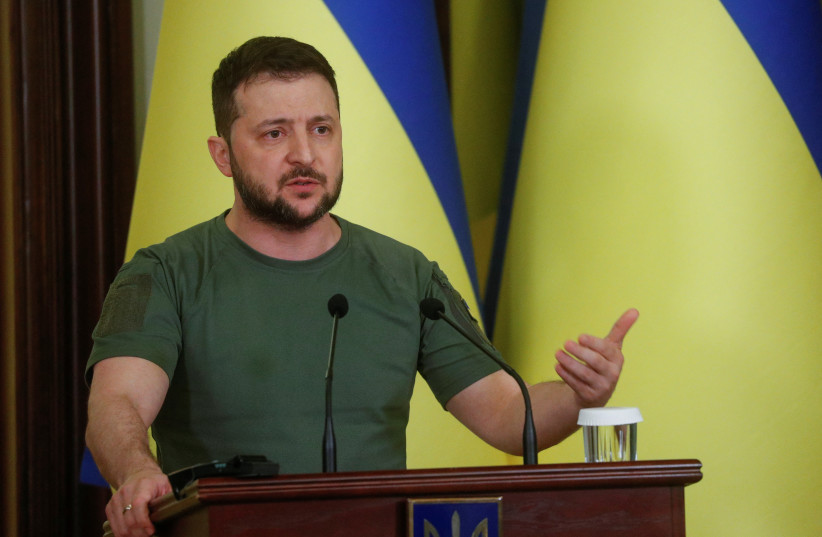A coordination center will be set up to move grain out of Ukrainian ports, officials with the Ukrainian and Turkish governments announced on Wednesday after a meeting in Istanbul on dealing with blocked cargo ships that have led to skyrocketing food prices around the world.
For more stories from The Media Line go to themedialine.org
United Nations Secretary-General Antonio Guterres said there was “very substantive progress” following the talks involving Ukraine, Russia and Turkey but that more technical work is needed.
He told reporters that the meeting generated agreements relating to coordination and demining and that he hoped the sides would come to a formal agreement.
“In a world darkened by global crises, today, at last, we have a ray of hope. A ray of hope to ease human suffering and alleviate hunger around the world,” Guterres said.
Ukrainian President Volodymyr Zelensky said late Wednesday night that his officials told him there was progress and that details would be discussed with the UN.

Remarks
An official from Zelensky’s office tweeted that a coordination center would be created in Istanbul “to carry out general monitoring and coordination of safe navigation in the Black Sea.”
Turkey’s Defense Minister Hulusi Akar said that representatives of all parties will participate in the coordination center and another meeting will be held next week where a deal will be signed.
The Russian embassy in Turkey tweeted, citing the Russian Ministry of Defense, that Russia has suggested a package of proposals to move agricultural products out of the Black Sea ports.
Ryan Bohl, a Middle East and North Africa analyst with RANE/Stratfor, warned that even if Russia signs an agreement, it should not be assumed it will follow through, based on its previous actions.
“We should be looking for the ships to actually get through the Turkish straits,” Bohl told The Media Line.
“Before we can say that there’s been a success, the Russians could readily sign an agreement or make promises that they then renege on or they find excuses to sabotage such an agreement later on,” he said.
Moscow engaged in talks and played down the risk of a war in the run-up to its full-scale invasion of Ukraine, and later participated in cease-fire talks.
Bohl said those meetings were simply optics and Russia’s interests aren’t served by finding a solution to the grain export crisis.
He says that the Kremlin’s strategy is to put major economic pressure on Ukraine and block exports to hurt Western countries, hoping that they will eventually take away some sanctions.
“Neither of those objectives are really served by Russia giving a good faith effort to get Ukrainian exports back onto the global market,” Bohl said.
He added that being part of the talks in Istanbul gives the Kremlin the ability to have a more positive image and appeal to people in Europe who are softer on Russia, such as Hungarian President Viktor Orban.
Daria Isachenko, an expert on Turkey and Russia at the German Institute for International and Security Affairs, said the fact that the UN is involved is itself a positive signal.
“The mere fact that such meetings take place is already significant,” she said. “It’s a sign that something is being done.”
She added that Russia’s withdrawal from Snake Island may be seen as a signal that it wants to make progress on the food cargo crisis.
Isachenko said that the grain issue is a challenge to Ankara’s relationship with Ukraine which it has tried to balance with its need to maintain ties with Moscow.
Turkey relies heavily on Russia for gas and tourism and has security vulnerabilities in Syria where the two countries support opposing sides.
Earlier this month, Kyiv said it was unacceptable that a Russian ship allegedly carrying grain from Ukraine left a port on Turkey’s coast.
However, Isachenko said that the talks to release cargo ships will be a major boost for Turkey, which has in recent years struggled to strengthen ties with its neighbors and fellow NATO members.
“It’s good for the image of Turkey within NATO… but also Turkish standing in the international arena,” she said.
